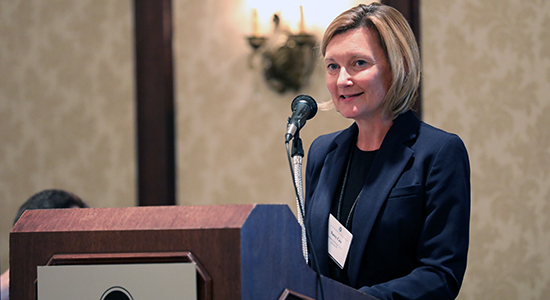
At the State Bar of Wisconsin's Board of Governors meeting. From left, State Bar President-elect Chris Rogers, Dist. 2 Gov. Karen Bauer, Young Lawyers Division representative Brandon Evans, Executive Director Larry Martin, and board chair Deanne Koll. For more photos, go to the State Bar’s Facebook page.
Sep. 25, 2017 – The State Bar of Wisconsin’s Board of Governors last Friday registered its opposition to a petition pending before the Wisconsin Supreme Court that would create a hybrid State Bar organization by funding it with mandatory and voluntary dues.
Steve Levine, a former president of the State Bar, filed petition 17-04 in April. It asks the supreme court to adopt new supreme court rules that govern the State Bar by changing the way the organization is funded through dues that members are required to pay.
Specifically, Levine calls for two budgets: one budget funded by mandatory dues and another funded by voluntary dues. Under Levine’s petition, mandatory dues could only fund four State Bar activities – preparing for and participating in rulemaking proceedings before the supreme court, administering the fund for client protection, administering the Wisconsin Lawyer Assistance Program (WisLAP), and the ethics counsel program.
Any other activities would be supported by voluntary dues, user fees, or other sources of revenue and would be segregated from mandatory dues. The supreme court could still order that mandatory dues fund other regulatory activities after a hearing.

Nancy Case, president of the Sheboygan County Bar Association, welcomes the board to Sheboygan County.
At its first meeting of the fiscal year, in Elkhart Lake, the State Bar’s 52-member board voted to oppose Levine’s petition. The board concurred with President Paul Swanson, President-elect Christopher Rogers, and immediate Past-president Fran Deisinger, who urged the supreme court, through counsel, to reject the petition in a response letter.
The petition seeks to “eliminate a system that has been constitutionally approved and worked well in Wisconsin for decades, only to replace it with an unworkable, unwieldy alternative that would exacerbate some of the very concerns it purports to solve and create a number of additional problems along the way,” the response letter states.
To date, the court has received two other letters in opposition to 17-04, and two in support. The supreme court will hold a public hearing on the petition on Oct. 30, 2017.
Petition on Class Actions
The board discussed, but took no action on, two other petitions that are pending before the Wisconsin Supreme Court. The Wisconsin Judicial Council filed both petitions.
Petition 17-03 would amend Wisconsin’s class action statutes to closely match the federal rules on class actions. Sherry Coley, a member of the Judicial Council Committee, said Wisconsin’s class action statute does not give much guidance.

Dist. 9 Gov. Anthony Gray hears discussion on the board's Policy Committee.
“It doesn’t really give a lot of guidance to practitioners or, more importantly, circuit court judges as far as what to do if a class action is filed,” Coley told the board. She noted limited case law that judges can look to when dealing with state-based class actions.
The Judicial Council believes Federal Rule of Civil Procedure 23, the federal class action rule, provides a good framework that Wisconsin can use to revise its own statute.
“Essentially, it’s time to update this,” Coley said.
Coley said the proposal would match Wisconsin class action statutes with Rule 23, besides a few key differences particular to Wisconsin, including a recent rule change that says class action residual funds go to the Wisconsin Trust Account Foundation.
The new statute would also retain an exception, included within the current Wisconsin statute, which prohibits class action claims for tax-related matters. The petition is scheduled for a public hearing on Oct. 30, 2017.
Petition on Multiparty Appellate Briefs
The board also discussed, but took no action on, a Judicial Council petition that would amend appellate rules relating to the size, number, and timing of appellate briefs that may be filed in multiparty cases. Coley also briefed the board on petition 17-05.
The petition noted a 2012 case, Henshue Construction v. Terra Engineering & Construction Corp., in which an appeals court noted “ambiguity in the appellate rules relating to the size and number of briefs that may be filed in multiparty cases.”

Dist. 9 Gov. Katie York, an attorney manager with the State Public Defender's Office, is a new board member this year.
Coley said the proposed rule creates more guidance on briefing issues in these types of cases, noting that no group had registered any opposition to the proposed changes. Petition 17-05 is scheduled for a public hearing on Nov. 6, 2017.
Other Business
- The board approved President Paul Swanson’s appointments to the Nomination Committee for the April 2018 State Bar election cycle: Mary Lynne Donohue, Kristen Hardy, Christopher Rogers, Diane Diel, and Bruce Brovold.
- The board approved Joel Skinner Jr. to serve out Deanne Koll’s term as a District 8 governor. Koll was elected to serve as board chair for fiscal year 2018.
- The board approved bylaw amendment requests from the Public Utilities Section and the Real Property, Probate, and Trust Law Section.
Upon request, interested members may obtain a copy of the minutes of each meeting of the Board of Governors. For more information, contact State Bar Executive Coordinator Jan Marks by email or by phone at (608) 250-6106.
